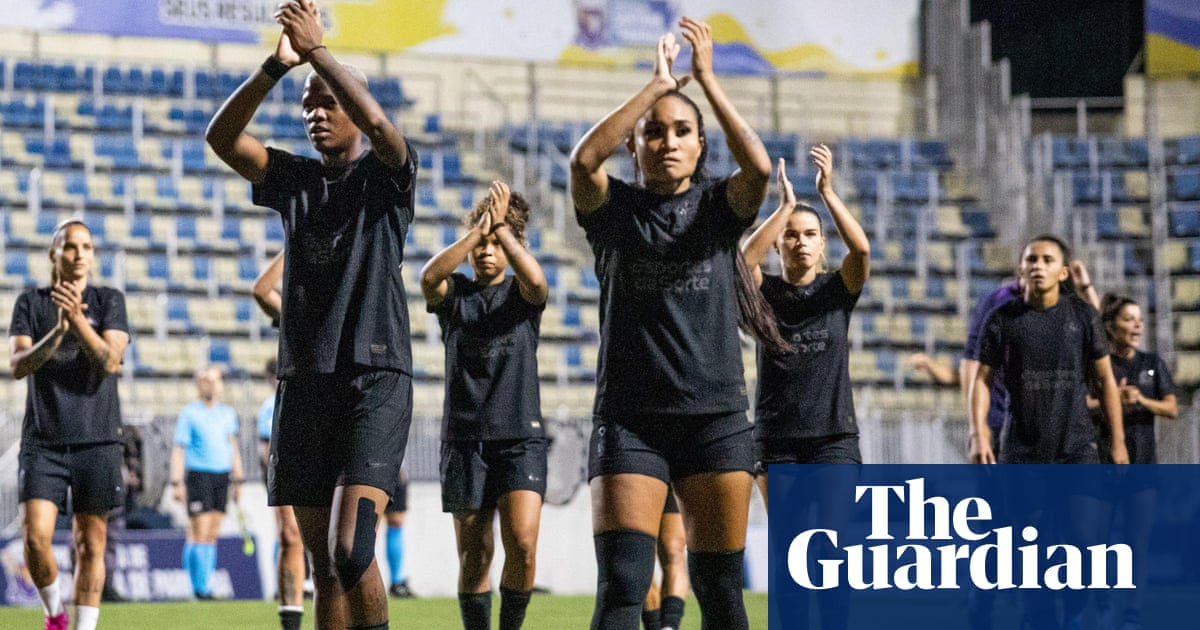After a nine-year hiatus, fans of Brazilian women’s football will once again be able to support their clubs in the Copa do Brasil. The cup will bring together 65 clubs from the three divisions of the national women’s football league, starting with a preliminary round on 21 May and concluding with the final in November. It is a return that has long been requested by the women’s football community in Brazil in order to expand the calendar for lower-division clubs and gives high-profile teams such as Flamengo, Corinthians and Santos another opportunity to compete for silverware.
However, all is not rosy on the Brazilian club scene only two years before Brazil are to host the Women’s World Cup for the first time. There have been a few years of growing sponsorship and visibility in the top tier, the Brasileirão A1, but this season has exposed the challenges facing the game.
Now approaching its 10th round of matches, not all Brasileirão games are broadcast by the TV rights holder, Globo. For some games the home team are allowed to stream them online but, despite this, several games have not been broadcast. The absence of sponsorship boards around the pitch and during player interviews highlight further difficulties. Last season the league had three main sponsors: Betano, Neoenergia and Binance. However, those contracts were not renewed and instead there are now messages against racism and gender-based violence.
In early April the sports news website GE reported that the Brazilian Football Confederation (CBF) was hopeful of securing new, improved sponsorship deals before the end of the first stage. Yet with only five rounds remaining before the knockout phase there have been no official updates. The CBF president, Ednaldo Rodrigues, has said that the offers it has received so far had been too low and accepting them would devalue the competition.
“We do not disregard those who were our sponsors in the past but football needs more and more investment – especially the women’s game,” he said at a press conference. “Sometimes people see women’s football as a burden but the CBF sees it as the football of the future, a football that requires investment. So if there are brands that value women, we will partner with them.
“But that does not mean, necessarily, that a contract that has expired will be automatically renewed. We will always pursue what is best for the organisation and that must mean increased value. Our previous deals started smaller and eventually became outdated.”
The former Brazil midfielder Formiga recently voiced her surprise and anger that the top flight still does not have a main sponsor. Talking at the launch of the Women’s Cup, a tournament to be hosted in Brazil in July featuring São Paulo, Palmeiras, Racing Louisville (of the United States), and Pachuca (Mexico), she said: “How can we host the World Cup and still not have a sponsorship in our main national league? It’s hard to accept. Those responsible for signing these deals need to realise that even small investments can make a huge difference in women’s football. We can’t live off scraps but whatever support we get can change the lives of many girls. We must take responsibility for the future of the game.”
Sponsorship in women’s football is vital not only for financial reasons but also for demonstrating the value of the competition and increasing its reach – which can attract further investment. In Brazil, a successful example is the Paulistão Feminino, the São Paulo state championship. While the national league currently has no sponsors, the Paulistão this week announced a record number of sponsors: seven in total, two more than last year, with the federation investing more than R$8m (£1.05m).
The return of the Copa do Brasil is a positive step towards strengthening women’s football in Brazil, but it must be executed in the right way. Clubs, particularly those in the lower divisions, need more matches on the calendar – but they also require support and visibility for real progress to be achieved.
Sign up toMoving the Goalposts
No topic is too small or too big for us to cover as we deliver a twice-weekly roundup of the wonderful world of women’s football
after newsletter promotion
If you have any questions or comments about any of our newsletters please emailmoving.goalposts@theguardian.com.
This is an extract from our free weekly email, Moving the Goalposts. To get the full edition,visit this page and follow the instructions. Moving the Goalposts is back in to its twice-weekly format, delivered to your inboxes every Tuesday and Thursday.
